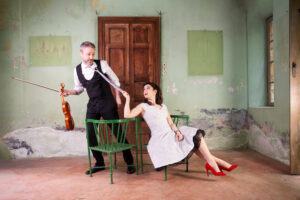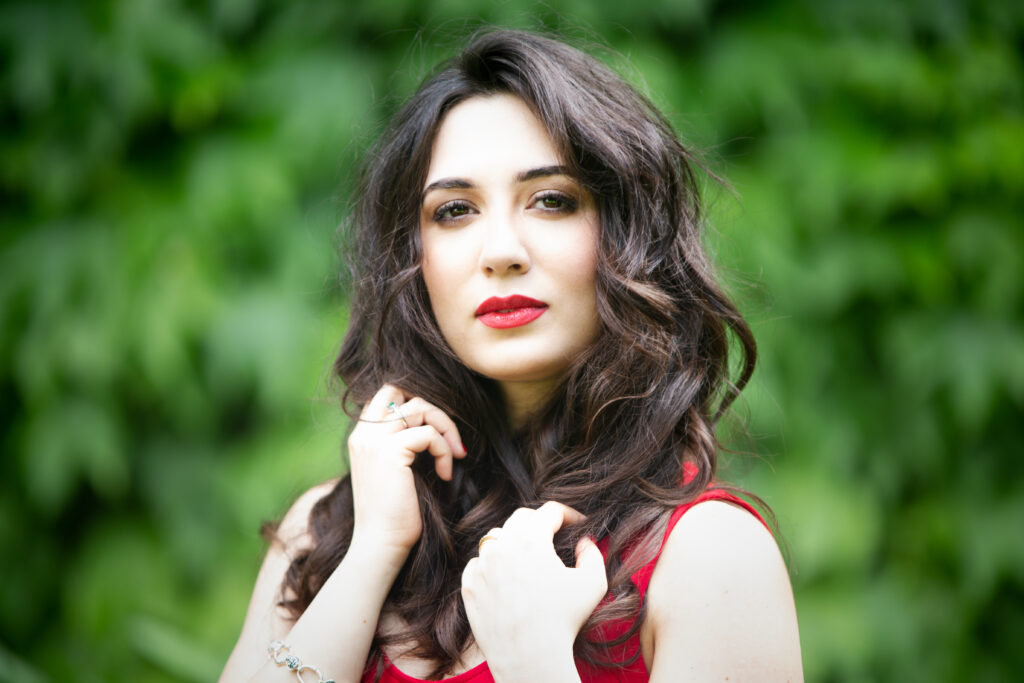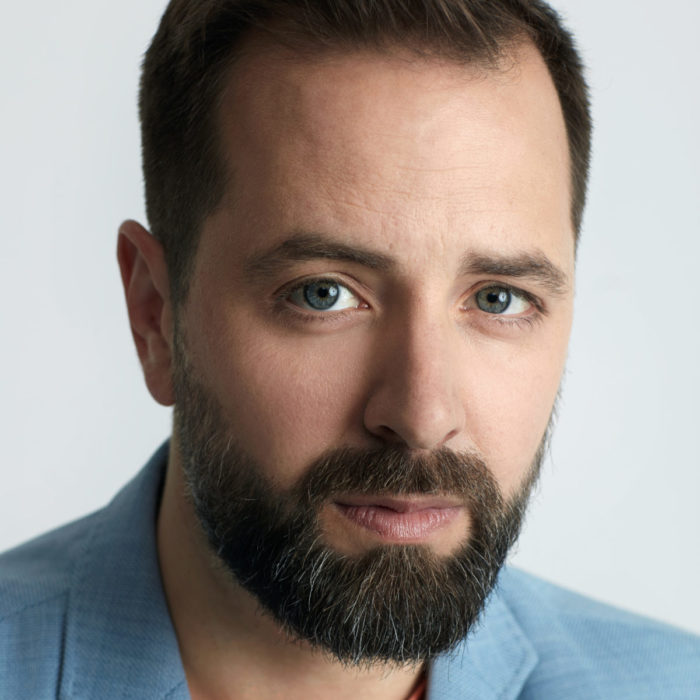
Q & A: Soprano Francesca Aspromonte & Violinist Boris Begelman on the Creation of ‘Un’Alma Innamorata’
By David Salazar“We met on the job around 10 years ago, for a few projects over some years. The first time not a word, the second a few, the third ‘Hey, would you like to do a concert program together’ and the fourth… was the last and here we are! It took me many hours in the kitchen, but I got him to marry me rather quickly, although he thinks he did everything on his own! The boring truth is that we very much enjoy spending time together, so we spice it up with some Maestro/Diva fights from time to time. And, most importantly, we fill our neighbors’ lives with lots of music, whether or not they want it.”
That is soprano Francesca Aspromonte describing how she and violinist/conductor Boris Begelman eventually came together to share a life of music and love, including their newest CD release, “Un’alma innamorata,” dedicated to the music.
Aspromonte is a champion of baroque and classical repertory who has performed at Teatro alla Scala, Carnegie Hall, Théâtre de Champs-Élysées, Grand Hall of the Moscow Conservatory, Zaryadye Hall, Opéra Royal de Versailles, Royal Albert Hall, Barbican Centre, Wigmore Hall, Wiener Musikverein, Theatre an- der-Wien, Wiener Konzerthaus, Fundaçao Gulbenkian in Lisbon, Teatro Real de Madrid, Teatro la Fenice, Grand Theatre de Provence, and Philharmonie Essen, among others.
Begelman has performed as a soloist or concertmaster with such organizations as Berliner Philharmonie, the Musikverein in Vienna, the Théâtre des Champs-Élysées, Wigmore Hall, the Liceu Theatre in Barcelona, the Opera Royal de Versailles, the KKL in Lucerne, collaborating with orchestras such as the Complesso Barocco, Kammerorchester Basel, I Barocchisti, Cappella Mediterranea, and B’Rock Orchestra. He is also the founder of Arsenale Sonoro, a baroque ensemble with which Begelman has made several recordings, including “Un’alma inamorata.”
The duo recently spoke to OperaWire amid promoting “Un’alma innamorata,” dedicated to the music of Händel.
OperaWire: What inspired the creation of “Un’alma inamorata?” How did you develop the album together?
Boris Begelman: I had the idea to play together with Francesca quite a few months before we became a couple, and the first attempt, the first Händelian draft, we tried at a festival in Timisoara. At that moment, the program was generally built around arias I liked and was eager to perform together. Luckily, Francesca, after a little bit, told me that it generally made no sense, so we should change the concept and look into the chamber cantatas. This is how “Un’alma innamorata” was born in 2018: we played it in a few concerts, and it was very close to the actual CD program. The only adjustment we made is that of “Tu fedel, tu costante” instead of some other cantata. A substitution I am very happy about!
Francesca Aspromonte: Our first project together was an all-Händel program as well, but it was a melting pot of arias. Didn’t make much sense. After a while, with some more research and sorting out many cantatas, we started shaping the program that is performed in the album, giving it a “fil rouge,” as well as somewhat of a realistic quality: everybody experiences love, but not everyone dies for it. I thought it would be fun to play with the fact that we are a couple ourselves, hence the title, and started thinking about the cover and the booklet, creating images that would speak of us and invite the audience to listen to something sparkling.
OW: What does Händel’s music mean to each of you?
BB: If I had to choose only one composer to represent the vastness of the Baroque era, I guess I’d choose Händel. His language, influenced by the so-dear-to-me Roman tradition of the beginning of the 18th century, is universal and easy to approach. He is a perfect example of a style mixture: a little bit of German, some French, some English, and lots of Italian. Händel’s music speaks right to your heart. Here, it brings joy and fun. Here, it makes you suffer and weep together with the character. Here, it brings you hope. It never leaves you indifferent and helps you to connect with the audience.
FA: Theatre. Händel is theater, and he has the rather astonishing ability to push the right button at the right moment. I also enjoy very much looking at how his work developed through the years and how much he learned from Italian composers, making these concepts his own. And, although he wrote incredibly beautiful music in his Italian operas, I am the most moved when listening (or playing or singing) his English works, such as “Acis and Galatea.” I find it to be pure poetry, the true Handelian soul.
OW: What is it like working together on this album? How do you inspire one another? What did you learn about one another while working on this album?
BB: Well, it was absolutely great. Francesca is fantastic, easy to work with, and inspires me and everyone else with every note she sings. Did I write it correctly, my love?
FA: We are nerds, and we spent a lot of our lives with our noses in books. So, what I like the most about our collaboration is that we constantly share what we’ve learned with each other. Boris is an incredible virtuoso. I’m very good with words, and we managed to positively influence one another in different aspects of our work: we can spend hours talking about how we would like to perform some pieces and why. On a more practical side, with this CD, I had further confirmation that my husband is a really patient man! I’m a professional procrastinator, which drives Boris mad.

Shootting Rocca di Soragna
OW: What were the greatest challenges of creating this album?
BB: There were quite a few, of course. These cantatas are quite well-known, and one of the biggest obstacles is the “tradition.” Looking at the music with fresh eyes and ears is not as easy as one expects. Then, of course, the recording process itself is so different from concert performances; one must find the balance between technical perfection (so to say) and musicality. As performing musicians, we learn to exaggerate on stage; we know we must make things bigger, sometimes at the edge of seeming a caricature, in order to transcend the message through the invisible barrier between the stage and the audience, but it’s totally different with the mics. If you do the same, it will sound like a caricature, but if you take the exaggerating out at all, it lacks the energy, the drive; it “doesn’t speak” anymore. In these cantatas, the violin is always in a dialogue with the voice but has to find a way to compensate for a tiny little thing the violin line misses – the words. My additional challenge was to play and conduct. I had to find a way to stop playing and start conducting in some places without making too much noise. Mics are very sensitive to such things.
FA: The recording process, of course, was the greatest challenge. It was harder than usual for me, this time oddly enough, because friends surrounded me, and I didn’t want to disappoint them. There is always a bit of an unhealthy strive for perfection when in front of a microphone. As I often say, a recording is like a picture; it freezes a moment in time. It captures whatever you are doing and frames it. You can’t change it. The most important thing when recording is to accept that. And that’s way easier said than done. There is always a lot of “I could have done it better,” so I have a little black cloud following me around in all my recording sessions… Maybe I should give her a name!
OW: What other projects do you have together in the future? Do you see another album together on the horizon, and if so, what might it be?
BB: There are many projects coming soon, including quite a few concerts in Italy, Germany, and France. And, of course, recordings. Some are already boiling in the pot; others are just ideas. The next album together will be recorded sometime next year, but I can’t tell you yet what it’s going to be.
Just one clue – the music is almost too beautiful to be true. Arsenale Sonoro, being based in Bologna, is concentrating its research on the music of the region. Such masters as Perti, Colonna, Predieri, and Vitali are performed way too little. One of the most important projects of next year for us (alongside the above-mentioned recording) is to perform for the first time in modern years a d.o.c. Bolognese oratorio with Francesca as one of the main roles.
FA: I like to say that when we married, Boris got half of my harpsichord, and I got half of his ensemble. When I think about a new piece I’d like to perform, I always imagine it played by Arsenale Sonoro’s musicians because we share the same thoughts about beauty, music aesthetics, and historically informed performance practice. We already have many other projects going on, and we will definitely keep recording, but it’s not yet time to disclose what!


